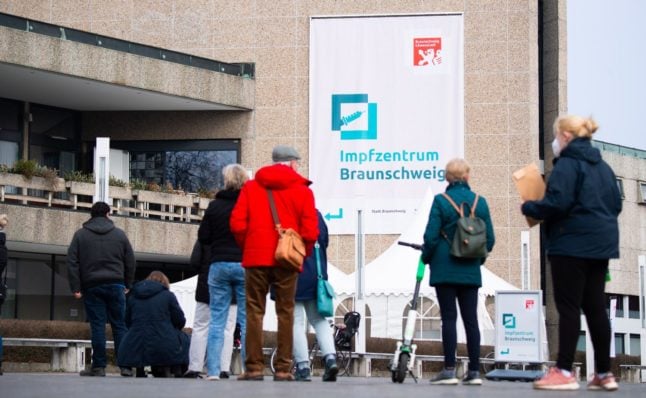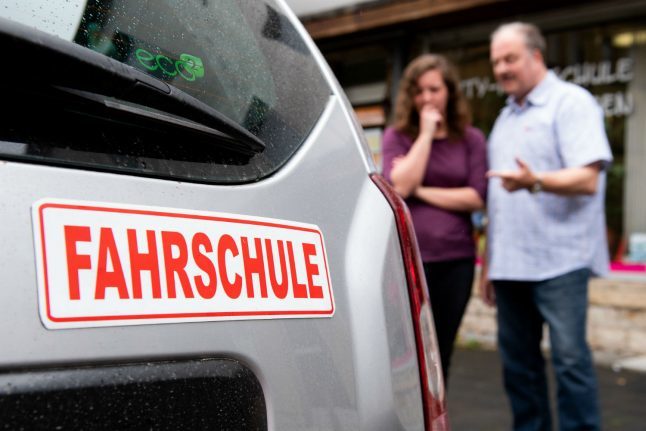Coronavirus updates for April
More regular Covid-19 testing in schools and companies
After the Easter holidays end, which varies from state to state, mass rapid testing in schools and daycare (Kitas) is to be extended. The aim is for all pupils, children, teachers and daycare workers to be tested twice a week for Covid-19.
Companies are also advised to have their employees tested once or if possible twice a week. A report on this is to be published at the beginning of April. If too few companies offer tests, compulsory testing could be enforced.
Some states, including Berlin, are already putting in place compulsory testing for people who work in close contact with others, such as supermarket employees from April 1st.
READ ALSO: How Berlin’s new coronavirus rules affect you
Shutdown extended until at least April 18th
Chancellor Angela Merkel and state leaders agreed on March 22nd to extend the shutdown in Germany until April 18th.
They also agreed to stick to national rules including strict shutdowns and curfews in areas with more than 100 new infections per 100,000 people over seven days as part of an “emergency brake”
But under Germany’s federal system, each state can ultimately decide its own rules and some have failed to impose curfews and gone ahead with reopening measures, despite fierce criticism.
The small southwestern state of Saarland has said it plans to end its shutdown completely and open leisure, sports and entertainment facilities after Easter to those who can provide a negative test.
Berlin is keeping shops open but with new testing obligations, while Tübingen has opened much of public life with testing.
Date for your diary: the next federal-state meeting is set for April 12th.
READ ALSO: What prompted Merkel to make a sudden U-turn on Easter shutdown in Germany?
Coronavirus vaccination possible at GPs
After Easter, family doctors in Germany will be allowed to start giving out vaccinations.
“With the quantities we expect in the first weeks of April, (…) it will initially be possible for GPs to start with the equivalent of one vaccination clinic per week,” Health Minister Jens Spahn told DPA.
The number of vaccinations carried out at GPs will be fairly low at the beginning – around 20 appointments per week – but there will be more as Germany receives extra doses.
READ ALSO: Germany to make vaccines available at GP practices: What you need to know
German newspaper FAZ reported that until April 25th vaccinations will initially be carried out only with Biontech/Pfizer, not with the vaccines from Moderna and AstraZeneca.
Johnson & Johnson arrives in Germany
The first shipments of the one-dose Johnson & Johnson vaccine, which is the fourth to be approved in Germany, is scheduled to arrive soon.
In April hundreds of thousands of doses are expected by the end of the month, according to a delivery forecast reported by DPA.
In May, 2.3 million doses are to follow, and 7.1 million are due to arrive in June.

People outside a vaccination centre in Braunschweig. Photo: DPA
In the third quarter, 22 million doses are expected, in the fourth quarter 4.6 million doses. The vaccine from Johnson & Johnson was approved in the EU on March 11th. Only one shot is needed, rather than two doses.
As we mentioned earlier, vaccinations from BioNTech/Pfizer, Moderna and AstraZeneca are already in use in Germany. More shipments of these vaccines are expected in the coming weeks, too.
READ ALSO: Germany ‘cannot ignore AstraZeneca findings’, says Merkel
What else is changing this month?
Public holidays
Good Friday is on April 2nd, while Easter Sunday is April 4th, and Easter Monday is on April 5th – these are national holidays across Germany. That means all shops are closed and most people don’t have to work.
Salary increases for the public sector
Employees in the public sector can look forward to more money from April, as wages will be increased by 1.4 per cent. It will mean people receive a pay rise of at least €50 a month.
According to the Interior Ministry, trainees and apprentices will also receive at least €50 more per month from April 1st.
The pay rise, agreed through collective bargaining, will also be applied to federal civil servants.
Members of the federal government, federal ministers, state secretaries and presidents of the highest federal courts are excluded from the pay increases.
Minimum wage increase
The minimum wage for care workers will increase on April 1st – but not equally throughout Germany. While care workers in western Germany are to earn €12.50 per hour, they will only earn €12.20 per hour in eastern Germany.
However, this unequal pay treatment is to be tackled, reported Focus Online.
Automatically ready for driving
Up until now, anyone who took the practical driving test in an automatic car was only allowed to drive automatic cars after they passed their test. From April, however, this restriction will be lifted.
It means drivers will be allowed to use a car that has a manual gear stick even if they passed the driving test with an automatic car.
However, learner drivers must have received at least 10 of their lessons in a car with a manual stick so they are able to use it.

Photo: DPA
More workers’ rights in the meat industry
Since the beginning of 2021, the use of subcontractors with low-wage workers has been banned in the meat industry in Germany.
From April 1st, temporary work will also be largely prohibited, paving the way for permanent staff. Companies with less than 50 employees are exempt from the new regulations.
Germany agreed to reform the meat industry after coronavirus outbreaks exposed bad living and working conditions for those working in slaughterhouses.
New regulations for cash register receipts
German supermarkets and stores with cash registers have to add more information to till receipts from April 1st.
As well as the various codes for accounting, the start and end time of the checkout process has to be noted on the slip – so you can see how quickly the cash was collected.
The aim is to help avoid tax fraud. The receipt should also be stored digitally.
Time to change winter tyres
From October to spring, drivers should have winter tyres on, according to experts. That means in April drivers can switch to summer tyres.
There is no general obligation to have winter tyres in Germany. However, according to the ADAC, tyres must be suitable for the weather. In winter conditions with snow and ice, you can’t be on the road with unsuitable tyres.
Free train hotlines
Train operator Deutsche Bahn already has a telephone hotline for queries – but customers have had to pay to use it. This will change from Thursday April 1st. Customers will be able to call DB free of charge.
Spargelzeit!
Lastly, the asparagus season, known as Spargelzeit, is starting in Germany. From the second week of April, an increasing supply of German asparagus can be expected in shops and restaurants across the country.
Germans are known for their love of white Spargel, which is usually cooked and served with potatoes.
READ ALSO: German word of the day – Spargelzeit




 Please whitelist us to continue reading.
Please whitelist us to continue reading.
Member comments